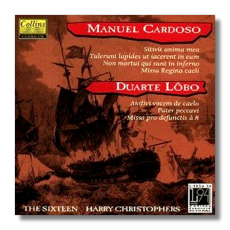
The Internet's Premier Classical Music Source
Related Links
-
Cardoso Reviews
D. Lôbo Reviews - Latest Reviews
- More Reviews
-
By Composer
-
Collections
DVD & Blu-ray
Books
Concert Reviews
Articles/Interviews
Software
Audio
Search Amazon
Recommended Links
Site News
 CD Review
CD Review
Frei Manuel Cardoso / Duarte Lôbo

Masses & Motets
- Manuel Cardoso:
- Missa Regina Caeli
- Motet "Sitivit anima mea"
- Motet "Tulerunt lapides ut iacerent in eum"
- Motet "Non mortui qui sunt in inferno"
- Duarte Lôbo:
- Missa pro defunctis à 8
- Motet "Audivi vocem de caelo"
- Motet "Pater peccavi"
The Sixteen/Harry Christophers
Collins Classics 14072 DDD 62:51
Hot on the heels of their outstanding disc of music by John Tavener (14052), for their latest recording under their exclusive contract with Collins Classics, Harry Christophers and The SIxteen now go back the best part of four centuries to music of the "Golden Age" of Portuguese polyphony, and to two of its finest composers, Manuel Cardoso (1566-1650) and Duarte Lôbo (1565-1646). The results are very fine indeed.
The principal works presented here are two large-scale mass settings, Cardoso's Missa Regina Caeli published in 1636 and Lôbo's first (eight-part) setting of the Missa pro Defunctis (1621 – there is also a six-part setting from 1639). The works are similar in that they share a general sobriety of approach: neither grabs the listener immediately, and there is little of the feeling for dramatic opportunity or individualist idiosyncrasy that pervades the work of, say, their near-contemporary Rebelo and not much of the hieratic austerity in some earlier Spanish masters. They are dissimilar in tone: the Cardoso is bright, light, floats in effortless lines (Ivan Moody's articulate notes ascribe this quality to its being in the equivalent of F Major); the Lôbo, virtually ignoring the harmonic possibilities of his eight parts, is simple and unassertive in a rather bashful, confessional manner – this is the serenity of resignation, not of transfiguration. But what both masses unambiguously are is deeply attractive; and if their understatement makes their character less than obvious, all the more reason to persist until the refined flavour reveals itself.
The accompanying motets offer a series of little gems, from the restrained dignity of Cardoso's Sitivit anima mea, the dramatic purposefulness of his Tulerunt lapides ut iacerent in eum and the restrained Non mortui qui sunt in inferno to Lôbo's poignant Audivi vocem de caelo and Pater peccavi. Each evokes a feeling of timelessness in the space of a few brief minutes.
It goes without saying that the performances are faultless, the vocal lines clear, firm and weightless, and the recording, made in St. Judes on the Hill in Hampstead Garden Suburb, combines a marvellously resonant acoustic with immediacy of sound – crystalline clarity with the sense of space that the music requires. Last year Naxos released the Lôbo mass in a performance by the Schola Cantorum of Oxford under Jeremy Summerly (8.550682; the coupling is the Cardoso setting of the Requiem). Summerly's sound is softer, with the upper voices more prominent than with Christophers, who manages a harder, more pointedly focussed tone that gives a more Ibérian tang to the music. The Naxos disc, of course, is half the price of this new one, which may decide your choice. But The Sixteen sing with far more character and the recorded sound is superior. If you can afford a few extra quid, go for Christophers. Strongly recommended.
Copyright © 1994 & 1998, Martin Anderson.
This review originally appeared in CD Review

















